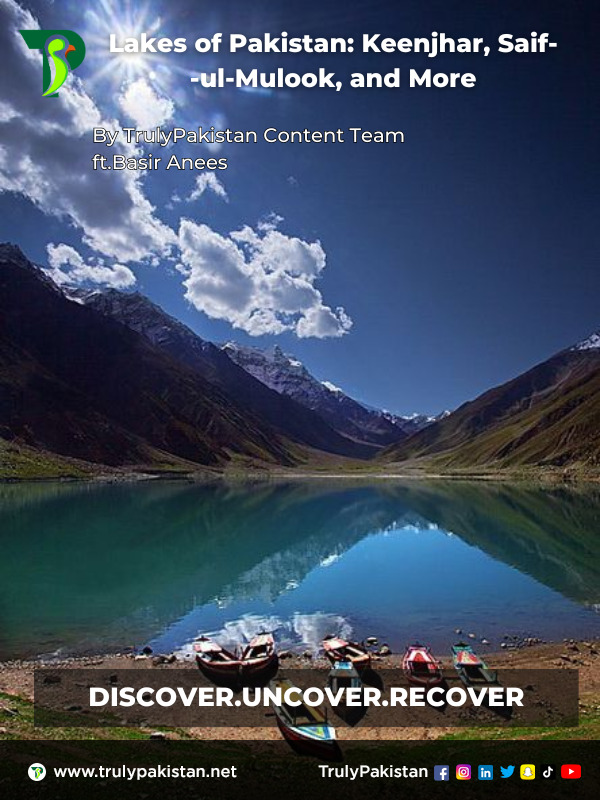Keenjhar Lake
Nestled in the Thatta District of Sindh, Keenjhar Lake, also known as Keenjhar Jheel, is a picturesque freshwater lake. It is historically significant as it is believed to be the location of the ancient city of Banbhore, one of the oldest civilizations in the region.
Keenjhar Lake is not just a body of water; it’s a source of livelihood for local fishermen and a sanctuary for migratory birds. Surrounded by lush greenery, it offers a tranquil escape from the hustle and bustle of urban life.


Keenjhar Lake
Saif-ul-Mulook Lake
Saif-ul-Mulook Lake, often shrouded in folklore and mystique, is a high-altitude alpine lake located in the Kaghan Valley of Khyber Pakhtunkhwa. The lake is renowned for its captivating beauty and is the subject of the famous Sufi tale, “Saif-ul-Mulook and the Fairy.”
Nestled among the towering peaks of the Himalayas, this lake is a paradise for trekkers and nature enthusiasts. It’s surrounded by snow-capped mountains, and its crystal-clear waters mirror the awe-inspiring landscape. Saif-ul-Mulook Lake is the perfect destination for those seeking tranquillity and a connection with nature.


Saif-ul-Mulook Lake
Shangrila Lake
Known as “Heaven on Earth,” Shangrila Lake, located in Skardu, Gilgit-Baltistan, lives up to its reputation. The lake is surrounded by lush gardens, giving it a paradisiacal charm. It’s often referred to as the “Lower Kachura Lake” to distinguish it from the nearby “Upper Kachura Lake.”
Shangrila Lake offers boating and picnicking opportunities, making it a popular spot for both tourists and locals. The stunning view of the lake, flanked by the Karakoram Mountains, is a sight to behold.


Shangrila Lake
Attabad Lake
Attabad Lake, formed as a result of a landslide in 2010, is located in the Gojal Valley of Hunza, Gilgit-Baltistan. The disaster, while tragic, led to the creation of this breathtaking lake, which stretches for over 20 kilometres.
The unique turquoise hue of the lake, surrounded by rocky terrain and steep cliffs, is a striking contrast to the arid landscape of the region. Attabad Lake has become a must-visit destination for travellers seeking nature’s marvels.


Attabad Lake
Rawal Lake
In the heart of the capital city, Islamabad, lies Rawal Lake, an artificial reservoir that provides drinking water to the city’s residents. This lake is a serene escape for the people of Islamabad, offering boating facilities and a peaceful environment for picnics and relaxation.
Surrounded by the Margalla Hills National Park, Rawal Lake provides a beautiful blend of nature and urban living, making it an ideal destination for a day out with family or friends.


Rawal Lake
Conclusion
These lakes are not only natural treasures but also crucial for the regions in which they are located. They offer opportunities for recreation, tourism, and, in some cases, are integral to local economies. Exploring these stunning lakes in Pakistan is an opportunity to witness the country’s natural beauty and diversity.
From the folklore-wrapped Saif-ul-Mulook Lake to the bustling Rawal Lake in the heart of Islamabad, each of these lakes has a unique story to tell and offers a glimpse into the breathtaking landscapes of Pakistan.
Whether you are an adventurer, a nature lover, or simply someone looking for a peaceful getaway, Pakistan’s lakes have something to offer to everyone.

